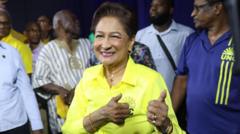With only days left until Australia's election, opposition candidates are actively engaging Chinese Australian voters through popular Chinese social media. As they face tougher competition from the Labor party, these candidates seek to reclaim support from a demographic that has swayed elections and is disillusioned with prior government rhetoric and policies.
Australia's Opposition Turns to Chinese Social Media to Court Voters

Australia's Opposition Turns to Chinese Social Media to Court Voters
Facing a crucial election, Australian opposition candidates are targeting Chinese Australian voters through WeChat and RedNote, social media platforms once feared for national security.
In a bid to regain lost support, Australian opposition candidates are leveraging Chinese social media platforms, WeChat and RedNote, to reach out to Chinese Australian voters, who played a pivotal role in the Labor party's victory in 2022. This is particularly significant as the Coalition’s past election strategies included concerns over national security tied to these platforms.
Approximately 60% of Chinese Australians utilize WeChat daily, which highlights its importance in communicating with this community, particularly in areas such as Sydney’s Burwood, often referred to as the city’s second Chinatown. Grange Chung, contesting for New South Wales' Reid seat, emphasized his commitment to this vibrant community in a video message, stating, “Australia gave us a home... Let me finish what I started,” as he promotes his vision for the future.
Chinese Australians previously leaned toward conservative parties, contributing to the Coalition's prolonged rule. However, growing discontent with perceived inadequate responses to racism during the pandemic, along with an uptick in anti-China sentiment from the previous government, has led to significant voter shifts in recent elections. Analysts note that the Liberal party is now focused on reclaiming the support of Chinese Australians, crucial given their impact in pivotal suburban electorates.
Chung, who has recently begun his campaign on WeChat, has targeted content toward the local Chinese community, sharing business interviews and cultural greetings. Researcher Fan Yang reported that the Liberals have ramped up their advertising on WeChat with over 220 ads placed since the beginning of the campaign season, indicating their strategic focus on this demographic, in stark contrast to Labor’s approximate 35 ads.
Reid resident Henry Luo recognizes the increased attention from candidates, with many opting to collaborate with Chinese influencers to resonate more with the community. Videos featuring non-ethnic Chinese politicians embracing Chinese culture have emerged, including Liberal MP Keith Wolohan, as they aim to build rapport.
However, experts warn that mere visibility on these platforms may not yield guaranteed votes, as Chinese Australians demonstrate increased political sophistication. Many may consider independent candidates who are not bound by party ideologies, which resonates with their desire for genuine representation.
Concerns linger within the community that they are primarily viewed as a voting bloc rather than being appreciated for their contributions. Sydney resident Erin Chew criticized the ongoing portrayal of the community amid allegations of espionage by politicians, raising alarms about the normalization of such narratives.
In the Bennelong electorate, where nearly one-third of the population has Chinese ancestry, Liberal candidate Scott Yung is utilizing bilingual outreach through WeChat to engage non-English speakers. Emphasizing the importance of China-Australia relations, he aims to address economic concerns that directly impact the local community.
Despite these efforts, some voters remain skeptical, particularly in light of the Coalition's general stance on migration and international students. As election day approaches, how Australian politicians navigate their approach to engaging with Chinese Australians could significantly influence the outcome of pivotal seats and reshape party visibility within this diverse community.




















